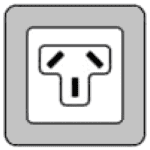Plug For Papua New Guinea: What You Need To Know
What is the plug for Papua New Guinea? Before you travel, check the information below to make sure your electronic devices are compatible with the outlet type and voltage.
Electrical Summary
Plug Compatibility: Type I
Voltage: 220V – 240V
Frequency: 50 Hz
Type I

Can North Americans use Electronics in Papua New Guinea without an Adapter?
No! North Americans will need an adapter for the outlets and a transformer for the voltage when traveling to Papua New Guinea. North Americans device plugs will not work with the outlet types in Papua New Guinea. Also, the voltage in Papua New Guinea is different from North American voltages.
Can Europeans use Electronics in Papua New Guinea without an adapter?
Europeans do not need a transformer when traveling to Papua New Guinea. The voltage in Papua New Guinea is the same as in Europe. However, Europeans will need a travel adapter when traveling to Papua New Guinea.
What Outlet does Papua New Guinea Use?
Type I

Type I plug sockets are used in Australia, New Zealand. They have two flat pins and a grounding pin. These plugs are typically used with devices that have a voltage of 230V.
Is it safe to drink water in Papua New Guinea?
We recommend always packing a filtered water bottle when traveling:
Travel Essentials
Be sure to check our list of travel essentials before your trip!
Should I get travel insurance when traveling to Papua New Guinea?
It is generally recommended to get travel insurance when traveling to a different country. Travel insurance can provide financial protection and peace of mind in case of unexpected events, such as medical emergencies, trip cancellations, lost or stolen baggage, or other travel-related mishaps.
Travel insurance can cover various expenses related to your trip, such as medical expenses, emergency medical transportation, trip cancellation or interruption, lost or stolen baggage or personal belongings, and other travel-related expenses.
Before purchasing travel insurance, it’s important to carefully review the policy details, including the coverage limits, exclusions, and any applicable deductibles or copays. You should also make sure that the policy covers any activities or destinations that you plan to participate in or visit during your trip.
Travel Summary
Papua New Guinea is known for its stunning natural beauty, with rugged mountains, dense rainforests, and pristine coral reefs. The country’s economy is largely based on agriculture, mining, and forestry, with a focus on exports such as gold, copper, palm oil, and coffee.
Papua New Guinea is a parliamentary democracy, with a governor-general as the head of state, who is appointed by the Queen of England, and a prime minister as the head of government. The country has a unicameral parliament, known as the National Parliament, which is made up of 111 members.
Despite its many strengths, Papua New Guinea faces a number of challenges, including poverty, healthcare, education, and infrastructure. The country is also vulnerable to natural disasters, such as earthquakes and volcanic eruptions, which have caused significant damage and loss of life in the past.
The government of Papua New Guinea has worked to address these challenges, with a focus on sustainable development, social welfare, and economic growth. The country has also been a vocal advocate for regional cooperation and has played an active role in the Pacific Islands Forum, a regional organization focused on promoting economic development and addressing common challenges.
Overall, Papua New Guinea is a unique and diverse country, with a rich cultural heritage and friendly people. The country’s natural environment is a major draw for visitors, and its cultural traditions and customs are a source of pride for its people. However, the country faces significant challenges in its development, and continued efforts are needed to address these challenges and promote sustainable growth and development.
Traveling to another country? Check out our Countries page for more info.